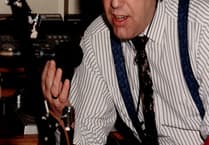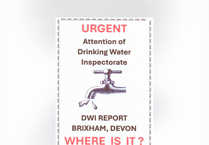MOST fellow citizens would agree that the Britain we are part of and cherish is lowered beyond our earlier knowledge of it.
If the editors of the Mid-Devon Advertiser are content, and in the spirit of its founder Sir Ray Tindle, I would be privileged to write here each week.
There are many subjects and they include our care – the upbringing of our dear children.
My thoughts would extend to the global. For instance, our so called banking ‘system’ and its sand, not sound, ‘foundations’. This week I briefly consider our societal disintegration.
The paper reported last week how a prisoner at Channing’s Wood (where I would occasionally go to see an inmate with a musculo-skeletal problem) threw a pail of vomit and faeces into the face of a female warder. A lady judge increased his time of incarceration.
The warder was understandably greatly upset and for a time afterwards. But one risk was not mentioned, and that was the risk of hepatitis given the number of drug addicts in our jails.
I recall an ‘incident’ during the justified responses to the ‘poll tax’. There was a march in Torbay. A policeman was spat upon.
He suffered meningitis as a result, and died of it. ‘What goes round, comes round.’ The poll tax was very unjust, but this poor man and his family suffered for it. I say ‘to care is the most important characteristic of any worthwhile society’.
Having helped healed thousands with good teams at my side, and dealt with so many more fellow citizens, I have seen a great deal and learned a lot.
I was born on the 14th of April 1940 in Lyndhurst in the beautiful New Forest, and in the Cottage Hospital – the Fenwick. The first of four of my dear Mum and Dad. He was a self-taught electronic engineer who left a British Army school in Limerick at age 14.
In September of that year, there were two massive blitzes of Southampton by the Luftwaffe of the most evil Nazi regime. Some 40,000 incendiary bombs allowed the glow to be seen from Cherbourg 40 miles away. One of 4,000 high explosive bombs made a crater of Dad’s family business of which he was a key part.
You could imagine his thoughts and fears when he went into the vital port town that day, with a little fellow and his dear wife back in a little cottage. He gathered his strength and serviced the vital radios from that cottage.
Britain and the world face crises most of us would never have imagined. We need to keep our nerve, recover our common sense, and do this.
My Mum liked David Nixon on early BBC TV. He was a conjurer and humourist, and was always in a dinner suit with a cheerful smile. He ‘signed off ’ at the end of each half hour programme with ‘be kind to one another’. Mum frequently recalled those words.



-Beaver-Trust.jpeg?width=209&height=140&crop=209:145,smart&quality=75)

Comments
This article has no comments yet. Be the first to leave a comment.